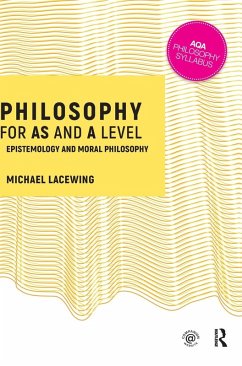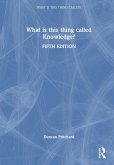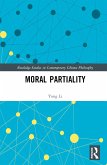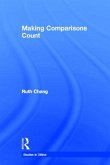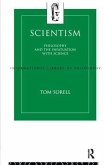- Gebundenes Buch
- Merkliste
- Auf die Merkliste
- Bewerten Bewerten
- Teilen
- Produkt teilen
- Produkterinnerung
- Produkterinnerung
Philosophy for AS and A Level and Philosophy for A Level are the Routledge textbooks for the new 2017 AQA AS and A Level Philosophy syllabus. Structured closely around the AQA specification these textbooks cover epistemology, moral philosophy, metaphysics of God and metaphysics of mind in an engaging and student-friendly way.
Andere Kunden interessierten sich auch für
![What Is This Thing Called Knowledge? What Is This Thing Called Knowledge?]() Duncan PritchardWhat Is This Thing Called Knowledge?161,99 €
Duncan PritchardWhat Is This Thing Called Knowledge?161,99 €![Metaethics Metaethics]() Mark van RoojenMetaethics210,99 €
Mark van RoojenMetaethics210,99 €![Moral Partiality Moral Partiality]() Yong LiMoral Partiality180,99 €
Yong LiMoral Partiality180,99 €![Making Comparisons Count Making Comparisons Count]() Ruth ChangMaking Comparisons Count199,99 €
Ruth ChangMaking Comparisons Count199,99 €![Ethics Ethics]() Harry J GenslerEthics187,99 €
Harry J GenslerEthics187,99 €![Noncognitivism in Ethics Noncognitivism in Ethics]() Mark SchroederNoncognitivism in Ethics180,99 €
Mark SchroederNoncognitivism in Ethics180,99 €![Scientism Scientism]() Tom SorellScientism219,99 €
Tom SorellScientism219,99 €-
-
-
Philosophy for AS and A Level and Philosophy for A Level are the Routledge textbooks for the new 2017 AQA AS and A Level Philosophy syllabus. Structured closely around the AQA specification these textbooks cover epistemology, moral philosophy, metaphysics of God and metaphysics of mind in an engaging and student-friendly way.
Hinweis: Dieser Artikel kann nur an eine deutsche Lieferadresse ausgeliefert werden.
Hinweis: Dieser Artikel kann nur an eine deutsche Lieferadresse ausgeliefert werden.
Produktdetails
- Produktdetails
- Verlag: Routledge
- Seitenzahl: 480
- Erscheinungstermin: 15. August 2017
- Englisch
- Abmessung: 250mm x 175mm x 30mm
- Gewicht: 1000g
- ISBN-13: 9781138436671
- ISBN-10: 1138436674
- Artikelnr.: 49208728
- Herstellerkennzeichnung
- Libri GmbH
- Europaallee 1
- 36244 Bad Hersfeld
- gpsr@libri.de
- Verlag: Routledge
- Seitenzahl: 480
- Erscheinungstermin: 15. August 2017
- Englisch
- Abmessung: 250mm x 175mm x 30mm
- Gewicht: 1000g
- ISBN-13: 9781138436671
- ISBN-10: 1138436674
- Artikelnr.: 49208728
- Herstellerkennzeichnung
- Libri GmbH
- Europaallee 1
- 36244 Bad Hersfeld
- gpsr@libri.de
Michael Lacewing is a teacher of philosophy and theology at Christ's Hospital school, and a former Reader in Philosophy and Vice-Principal Academic at Heythrop College, University of London. He is founder of the company A Level Philosophy (www.alevelphilosophy.co.uk), and advises the British Philosophical Association on matters related to philosophy in schools.
Contents
Permissions
Introduction
How to use this book
How to do philosophy
Following the syllabus
Additional features
Using the anthology
Glossary
Companion website and further resources
Acknowledgements
1 How to do philosophy
Philosophical argument
Deductive argument
Inductive argument
Hypothetical reasoning
Understanding arguments and argument maps
Evaluating arguments
Evaluating claims
An aside: why reason?
Fallacies
Reading philosophy
Approaching the text
Engaging with the text
Beyond the text
Writing philosophy
What you need to know
Planning an essay
Writing an essay
A standard essay structure
General advice
2 Epistemology
I. What is knowledge?
A. Knowledge and its definition
Types of knowledge
Propositional knowledge
The definition of knowledge
The purpose and nature of definition
Can propositional knowledge be defined?
Key points: knowledge and its definition
B. The tripartite view
The tripartite definition of knowledge
Why justified true belief?
Thinking harder: A note on certainty
Are the conditions individually necessary?
Justification is not a necessary condition of knowledge
Truth is not a necessary condition of knowledge
Belief is not a necessary condition of knowledge
Gettier's objection: are the conditions jointly sufficient?
Key points: the tripartite view
C. Responses
Add a 'no false lemmas' condition (J+T+B+N)
Infallibilism
Thinking harder: rejecting the argument for infallibilism
Reliabilism (R+T+B)
Truth and the third condition
Virtue epistemology (V+T+B)
Zagzebski's analysis of knowledge
Key points: Responses
Summary: What is knowledge?
II. Perception as a source of knowledge
A. Direct realism
The argument from perceptual variation
Responses
The argument from illusion
Thinking harder: the argument from hallucination
The disjunctive theory of perception
The time-lag argument
Thinking harder: direct realism and openness
Key points: direct realism
B. Indirect realism
What are sense-data?
Why indirect realism?
Locke's distinction between primary and secondary qualities
Scepticism about the existence of mind-independent objects
The existence of the external world is the best hypothesis
Two supporting arguments
Thinking harder: the existence of mind-independent objects is not a
hypothesis
Representation, resemblance and the nature of physical objects
Berkeley's argument that mind-dependent ideas cannot be like
mind-independent objects
Key points: indirect realism
C. Berkeley's idealism
Berkeley on primary and secondary qualities
Berkeley on secondary qualities
Berkeley's attack on the primary/secondary quality distinction
The immediate objects of perception are mind-dependent objects
Three arguments against mind-independent objects
Berkeley's 'master' argument
Idealism and God
Thinking harder: idealism and the cause of our perceptions
Issues with Berkeley's idealism
Problems with the role played by God in Berkeley's idealism
Arguments from illusion and hallucination
Idealism leads to solipsism
Key points: Berkeley's idealism
Summary: perception as a source of knowledge
III. Reason as a source of knowledge
Rationalism, empiricism and innatism
A priori/a posteriori knowledge
Analytic/synthetic propositions
Necessary/contingent truth
Defining rationalism, empiricism and innatism
Key points: rationalism, empiricism and innatism
A. Innatism
Two arguments for innate knowledge
Plato's slave boy argument
Leibniz on knowledge of necessary truths
Locke's arguments against innate knowledge
Leibniz's response to Locke
Thinking harder: experience triggers innate knowledge
Alternative empiricist accounts
Locke's argument against innate concepts
Rejecting Locke's definition of 'innate concept'
Leibniz's defence of innate concepts
The mind as a 'tabula rasa'
Locke's two sources of concepts
Hume on impressions and ideas
Simple and complex concepts
Issues with the empiricist theory of concepts
Thinking harder: challenging the copy principle
Leibniz on 'intellectual ideas'
Thinking harder: the concept of substance
Discussion
Key points: innatism
B. The intuition and deduction thesis
Rationalism and empiricism revisited
The meaning of 'intuition' and 'deduction'
Empiricist alternatives
Hume's fork
Descartes' theory of rational intuition
The cogito
Clear and distinct ideas
Empiricist responses to the cogito
Clear and distinct ideas and God
Descartes' Trademark argument
Thinking harder: degrees of reality
Empiricist responses to the Trademark argument
Descartes' cosmological argument
Empiricist responses to Descartes' cosmological argument
Descartes' ontological argument
Empiricist responses to Descartes' ontological argument
Descartes' proof of the external world
The concept of a physical object
Thinking harder: The existence of physical objects
Empiricist responses to Descartes' proof of the external world
Key points: the intuition and deduction thesis
Summary: reason as a source of knowledge
IV. The limits of knowledge
A. Philosophical scepticism
The particular nature of philosophical scepticism
Am I a brain in a vat?
The distinction between philosophical scepticism and normal incredulity
Local and global scepticism
Descartes' sceptical arguments
Key points: philosophical scepticism
B. Responses to scepticism
Descartes' own response
Empiricist responses
Thinking harder: Direct realism
Thinking harder: Reliabilism
Key points: responses to scepticism
Summary: the limits of knowledge
3 Moral Philosophy
I. Normative ethical theories
A. Utilitarianism
Bentham's quantitative hedonistic utilitarianism
'The Principle of Utility'
'Measuring Pleasure and Pain'
Mill on utilitarianism
Mill's qualitative hedonistic utilitarianism
Is pleasure the only good?
Smart on hedonistic and non-hedonistic utilitarianism
Nozick's experience machine
Preference utilitarianism
Mill's 'proof' of utilitarianism
Stage 1: Happiness is good
Stage 2: Only happiness is good
Issues for (act) utilitarianism
Problems with calculation
Fairness, individual liberty and rights
Partiality
Moral integrity and the individual's intentions
Rule utilitarianism
Smart on rule utilitarianism
Rule utilitarianism developed
Objections
Key points: utilitarianism
B. Kantian deontological ethics
Deontology
Kant's account of the good will and duty
The good will
The distinction between acting in accordance with duty and acting out of
duty
Thinking harder: The good will again
The categorical imperative
Hypothetical and categorical imperatives
Thinking harder: Contradiction in conception and contradiction in will
The second formulation of the Categorical Imperative
Issues for Kantian deontological ethics
Universalisability and morality
Conflicts between duties
The view that consequences of actions determine their moral value
Morality is a system of hypothetical imperatives
The value of certain motives
Key points: Kantian deontological ethics
C. Aristotelian virtue ethics
The good for human beings
Eudaimonia
Final ends
The function argument
Testing the analysis
Thinking harder: the rational 'soul'
Aristotle's account of virtues
Virtues as character traits
Virtues, the doctrine of the mean and the importance of feelings
The role of education in the development of a moral character
Practical wisdom
The role of practical wisdom
The relation between practical wisdom, virtue and action
Key points: Aristotelian virtue ethics (I)
Eudaimonia, pleasure and philosophy
Eudaimonia and pleasure
Eudaimonia and philosophy
Voluntary action, choice and moral responsibility
Voluntary and involuntary actions
Choice and deliberation
Thinking harder: moral responsibility
Justice
Issues for Aristotelian virtue ethics
Guidance on how to act
Conflicts between virtues
The possibility of circularity involved in defining virtuous acts and
virtuous people in terms of each other
Thinking harder: Virtue and eudaimonia
Key points: Aristotelian virtue ethics (II)
Summary: normative ethical theories
II. Applied ethics
Stealing
Utilitarianism
Kantian deontology
Aristotelian virtue ethics
Eating animals
Utilitarianism
Kantian deontology
Aristotle, Diamond and virtue ethics
Simulated killing
Playing the killer
An audience's perspective
Telling lies
Utilitarianism
Kantian deontology
Aristotelian virtue ethics
Key points: applied ethics
Summary: applied ethics
III. Metaethics
What is metaethics?
The origins of moral principles: reason, emotion/attitudes, or society
The distinction between cognitivism and non-cognitivism
Key points: The distinction between cognitivism and non-cognitivism
A. Moral realism
From cognitivism to moral realism
Moral naturalism
Utilitarianism as naturalism
Thinking harder: naturalism in virtue ethics
Moral non-naturalism: Moore's intuitionism
The naturalistic fallacy
The open question argument
Thinking harder: is the 'naturalistic fallacy' a real fallacy?
Intuitionism
Objections
Issues for moral realism
A J Ayer's verification principle
The argument from Hume's fork
Hume's argument from motivation
Hume's is-ought gap
Mackie's argument from relativity
Mackie's arguments from queerness
Key points: moral realism
B. Moral anti-realism
Error theory
Non-cognitivism and moral anti-realism
Emotivism
Emotivism and subjectivism
Ayer's defence
Emotivism after Ayer
Prescriptivism
Prescriptive meaning
Good
Moral language
Issues for moral anti-realism
Can moral anti-realism account for how we use moral language?
Thinking harder: disagreement and moral argument
Whether moral anti-realism becomes moral nihilism
Moral progress
Key points: moral anti-realism
Metaethics and applied ethics
Summary: metaethics
4 Preparing for the exam
The examination
The structure of the exam
Assessment objectives
Understanding the question: giving the examiners what they are looking for
Short-answer questions
Nine-mark questions
Fifteen-mark questions
Revision: it's more than memory
Exam technique: getting the best result you can
Revision tips
Exam tips
Glossary (with Joanne Lovesey)
Index by syllabus content
Subject index
Permissions
Introduction
How to use this book
How to do philosophy
Following the syllabus
Additional features
Using the anthology
Glossary
Companion website and further resources
Acknowledgements
1 How to do philosophy
Philosophical argument
Deductive argument
Inductive argument
Hypothetical reasoning
Understanding arguments and argument maps
Evaluating arguments
Evaluating claims
An aside: why reason?
Fallacies
Reading philosophy
Approaching the text
Engaging with the text
Beyond the text
Writing philosophy
What you need to know
Planning an essay
Writing an essay
A standard essay structure
General advice
2 Epistemology
I. What is knowledge?
A. Knowledge and its definition
Types of knowledge
Propositional knowledge
The definition of knowledge
The purpose and nature of definition
Can propositional knowledge be defined?
Key points: knowledge and its definition
B. The tripartite view
The tripartite definition of knowledge
Why justified true belief?
Thinking harder: A note on certainty
Are the conditions individually necessary?
Justification is not a necessary condition of knowledge
Truth is not a necessary condition of knowledge
Belief is not a necessary condition of knowledge
Gettier's objection: are the conditions jointly sufficient?
Key points: the tripartite view
C. Responses
Add a 'no false lemmas' condition (J+T+B+N)
Infallibilism
Thinking harder: rejecting the argument for infallibilism
Reliabilism (R+T+B)
Truth and the third condition
Virtue epistemology (V+T+B)
Zagzebski's analysis of knowledge
Key points: Responses
Summary: What is knowledge?
II. Perception as a source of knowledge
A. Direct realism
The argument from perceptual variation
Responses
The argument from illusion
Thinking harder: the argument from hallucination
The disjunctive theory of perception
The time-lag argument
Thinking harder: direct realism and openness
Key points: direct realism
B. Indirect realism
What are sense-data?
Why indirect realism?
Locke's distinction between primary and secondary qualities
Scepticism about the existence of mind-independent objects
The existence of the external world is the best hypothesis
Two supporting arguments
Thinking harder: the existence of mind-independent objects is not a
hypothesis
Representation, resemblance and the nature of physical objects
Berkeley's argument that mind-dependent ideas cannot be like
mind-independent objects
Key points: indirect realism
C. Berkeley's idealism
Berkeley on primary and secondary qualities
Berkeley on secondary qualities
Berkeley's attack on the primary/secondary quality distinction
The immediate objects of perception are mind-dependent objects
Three arguments against mind-independent objects
Berkeley's 'master' argument
Idealism and God
Thinking harder: idealism and the cause of our perceptions
Issues with Berkeley's idealism
Problems with the role played by God in Berkeley's idealism
Arguments from illusion and hallucination
Idealism leads to solipsism
Key points: Berkeley's idealism
Summary: perception as a source of knowledge
III. Reason as a source of knowledge
Rationalism, empiricism and innatism
A priori/a posteriori knowledge
Analytic/synthetic propositions
Necessary/contingent truth
Defining rationalism, empiricism and innatism
Key points: rationalism, empiricism and innatism
A. Innatism
Two arguments for innate knowledge
Plato's slave boy argument
Leibniz on knowledge of necessary truths
Locke's arguments against innate knowledge
Leibniz's response to Locke
Thinking harder: experience triggers innate knowledge
Alternative empiricist accounts
Locke's argument against innate concepts
Rejecting Locke's definition of 'innate concept'
Leibniz's defence of innate concepts
The mind as a 'tabula rasa'
Locke's two sources of concepts
Hume on impressions and ideas
Simple and complex concepts
Issues with the empiricist theory of concepts
Thinking harder: challenging the copy principle
Leibniz on 'intellectual ideas'
Thinking harder: the concept of substance
Discussion
Key points: innatism
B. The intuition and deduction thesis
Rationalism and empiricism revisited
The meaning of 'intuition' and 'deduction'
Empiricist alternatives
Hume's fork
Descartes' theory of rational intuition
The cogito
Clear and distinct ideas
Empiricist responses to the cogito
Clear and distinct ideas and God
Descartes' Trademark argument
Thinking harder: degrees of reality
Empiricist responses to the Trademark argument
Descartes' cosmological argument
Empiricist responses to Descartes' cosmological argument
Descartes' ontological argument
Empiricist responses to Descartes' ontological argument
Descartes' proof of the external world
The concept of a physical object
Thinking harder: The existence of physical objects
Empiricist responses to Descartes' proof of the external world
Key points: the intuition and deduction thesis
Summary: reason as a source of knowledge
IV. The limits of knowledge
A. Philosophical scepticism
The particular nature of philosophical scepticism
Am I a brain in a vat?
The distinction between philosophical scepticism and normal incredulity
Local and global scepticism
Descartes' sceptical arguments
Key points: philosophical scepticism
B. Responses to scepticism
Descartes' own response
Empiricist responses
Thinking harder: Direct realism
Thinking harder: Reliabilism
Key points: responses to scepticism
Summary: the limits of knowledge
3 Moral Philosophy
I. Normative ethical theories
A. Utilitarianism
Bentham's quantitative hedonistic utilitarianism
'The Principle of Utility'
'Measuring Pleasure and Pain'
Mill on utilitarianism
Mill's qualitative hedonistic utilitarianism
Is pleasure the only good?
Smart on hedonistic and non-hedonistic utilitarianism
Nozick's experience machine
Preference utilitarianism
Mill's 'proof' of utilitarianism
Stage 1: Happiness is good
Stage 2: Only happiness is good
Issues for (act) utilitarianism
Problems with calculation
Fairness, individual liberty and rights
Partiality
Moral integrity and the individual's intentions
Rule utilitarianism
Smart on rule utilitarianism
Rule utilitarianism developed
Objections
Key points: utilitarianism
B. Kantian deontological ethics
Deontology
Kant's account of the good will and duty
The good will
The distinction between acting in accordance with duty and acting out of
duty
Thinking harder: The good will again
The categorical imperative
Hypothetical and categorical imperatives
Thinking harder: Contradiction in conception and contradiction in will
The second formulation of the Categorical Imperative
Issues for Kantian deontological ethics
Universalisability and morality
Conflicts between duties
The view that consequences of actions determine their moral value
Morality is a system of hypothetical imperatives
The value of certain motives
Key points: Kantian deontological ethics
C. Aristotelian virtue ethics
The good for human beings
Eudaimonia
Final ends
The function argument
Testing the analysis
Thinking harder: the rational 'soul'
Aristotle's account of virtues
Virtues as character traits
Virtues, the doctrine of the mean and the importance of feelings
The role of education in the development of a moral character
Practical wisdom
The role of practical wisdom
The relation between practical wisdom, virtue and action
Key points: Aristotelian virtue ethics (I)
Eudaimonia, pleasure and philosophy
Eudaimonia and pleasure
Eudaimonia and philosophy
Voluntary action, choice and moral responsibility
Voluntary and involuntary actions
Choice and deliberation
Thinking harder: moral responsibility
Justice
Issues for Aristotelian virtue ethics
Guidance on how to act
Conflicts between virtues
The possibility of circularity involved in defining virtuous acts and
virtuous people in terms of each other
Thinking harder: Virtue and eudaimonia
Key points: Aristotelian virtue ethics (II)
Summary: normative ethical theories
II. Applied ethics
Stealing
Utilitarianism
Kantian deontology
Aristotelian virtue ethics
Eating animals
Utilitarianism
Kantian deontology
Aristotle, Diamond and virtue ethics
Simulated killing
Playing the killer
An audience's perspective
Telling lies
Utilitarianism
Kantian deontology
Aristotelian virtue ethics
Key points: applied ethics
Summary: applied ethics
III. Metaethics
What is metaethics?
The origins of moral principles: reason, emotion/attitudes, or society
The distinction between cognitivism and non-cognitivism
Key points: The distinction between cognitivism and non-cognitivism
A. Moral realism
From cognitivism to moral realism
Moral naturalism
Utilitarianism as naturalism
Thinking harder: naturalism in virtue ethics
Moral non-naturalism: Moore's intuitionism
The naturalistic fallacy
The open question argument
Thinking harder: is the 'naturalistic fallacy' a real fallacy?
Intuitionism
Objections
Issues for moral realism
A J Ayer's verification principle
The argument from Hume's fork
Hume's argument from motivation
Hume's is-ought gap
Mackie's argument from relativity
Mackie's arguments from queerness
Key points: moral realism
B. Moral anti-realism
Error theory
Non-cognitivism and moral anti-realism
Emotivism
Emotivism and subjectivism
Ayer's defence
Emotivism after Ayer
Prescriptivism
Prescriptive meaning
Good
Moral language
Issues for moral anti-realism
Can moral anti-realism account for how we use moral language?
Thinking harder: disagreement and moral argument
Whether moral anti-realism becomes moral nihilism
Moral progress
Key points: moral anti-realism
Metaethics and applied ethics
Summary: metaethics
4 Preparing for the exam
The examination
The structure of the exam
Assessment objectives
Understanding the question: giving the examiners what they are looking for
Short-answer questions
Nine-mark questions
Fifteen-mark questions
Revision: it's more than memory
Exam technique: getting the best result you can
Revision tips
Exam tips
Glossary (with Joanne Lovesey)
Index by syllabus content
Subject index
Contents
Permissions
Introduction
How to use this book
How to do philosophy
Following the syllabus
Additional features
Using the anthology
Glossary
Companion website and further resources
Acknowledgements
1 How to do philosophy
Philosophical argument
Deductive argument
Inductive argument
Hypothetical reasoning
Understanding arguments and argument maps
Evaluating arguments
Evaluating claims
An aside: why reason?
Fallacies
Reading philosophy
Approaching the text
Engaging with the text
Beyond the text
Writing philosophy
What you need to know
Planning an essay
Writing an essay
A standard essay structure
General advice
2 Epistemology
I. What is knowledge?
A. Knowledge and its definition
Types of knowledge
Propositional knowledge
The definition of knowledge
The purpose and nature of definition
Can propositional knowledge be defined?
Key points: knowledge and its definition
B. The tripartite view
The tripartite definition of knowledge
Why justified true belief?
Thinking harder: A note on certainty
Are the conditions individually necessary?
Justification is not a necessary condition of knowledge
Truth is not a necessary condition of knowledge
Belief is not a necessary condition of knowledge
Gettier's objection: are the conditions jointly sufficient?
Key points: the tripartite view
C. Responses
Add a 'no false lemmas' condition (J+T+B+N)
Infallibilism
Thinking harder: rejecting the argument for infallibilism
Reliabilism (R+T+B)
Truth and the third condition
Virtue epistemology (V+T+B)
Zagzebski's analysis of knowledge
Key points: Responses
Summary: What is knowledge?
II. Perception as a source of knowledge
A. Direct realism
The argument from perceptual variation
Responses
The argument from illusion
Thinking harder: the argument from hallucination
The disjunctive theory of perception
The time-lag argument
Thinking harder: direct realism and openness
Key points: direct realism
B. Indirect realism
What are sense-data?
Why indirect realism?
Locke's distinction between primary and secondary qualities
Scepticism about the existence of mind-independent objects
The existence of the external world is the best hypothesis
Two supporting arguments
Thinking harder: the existence of mind-independent objects is not a
hypothesis
Representation, resemblance and the nature of physical objects
Berkeley's argument that mind-dependent ideas cannot be like
mind-independent objects
Key points: indirect realism
C. Berkeley's idealism
Berkeley on primary and secondary qualities
Berkeley on secondary qualities
Berkeley's attack on the primary/secondary quality distinction
The immediate objects of perception are mind-dependent objects
Three arguments against mind-independent objects
Berkeley's 'master' argument
Idealism and God
Thinking harder: idealism and the cause of our perceptions
Issues with Berkeley's idealism
Problems with the role played by God in Berkeley's idealism
Arguments from illusion and hallucination
Idealism leads to solipsism
Key points: Berkeley's idealism
Summary: perception as a source of knowledge
III. Reason as a source of knowledge
Rationalism, empiricism and innatism
A priori/a posteriori knowledge
Analytic/synthetic propositions
Necessary/contingent truth
Defining rationalism, empiricism and innatism
Key points: rationalism, empiricism and innatism
A. Innatism
Two arguments for innate knowledge
Plato's slave boy argument
Leibniz on knowledge of necessary truths
Locke's arguments against innate knowledge
Leibniz's response to Locke
Thinking harder: experience triggers innate knowledge
Alternative empiricist accounts
Locke's argument against innate concepts
Rejecting Locke's definition of 'innate concept'
Leibniz's defence of innate concepts
The mind as a 'tabula rasa'
Locke's two sources of concepts
Hume on impressions and ideas
Simple and complex concepts
Issues with the empiricist theory of concepts
Thinking harder: challenging the copy principle
Leibniz on 'intellectual ideas'
Thinking harder: the concept of substance
Discussion
Key points: innatism
B. The intuition and deduction thesis
Rationalism and empiricism revisited
The meaning of 'intuition' and 'deduction'
Empiricist alternatives
Hume's fork
Descartes' theory of rational intuition
The cogito
Clear and distinct ideas
Empiricist responses to the cogito
Clear and distinct ideas and God
Descartes' Trademark argument
Thinking harder: degrees of reality
Empiricist responses to the Trademark argument
Descartes' cosmological argument
Empiricist responses to Descartes' cosmological argument
Descartes' ontological argument
Empiricist responses to Descartes' ontological argument
Descartes' proof of the external world
The concept of a physical object
Thinking harder: The existence of physical objects
Empiricist responses to Descartes' proof of the external world
Key points: the intuition and deduction thesis
Summary: reason as a source of knowledge
IV. The limits of knowledge
A. Philosophical scepticism
The particular nature of philosophical scepticism
Am I a brain in a vat?
The distinction between philosophical scepticism and normal incredulity
Local and global scepticism
Descartes' sceptical arguments
Key points: philosophical scepticism
B. Responses to scepticism
Descartes' own response
Empiricist responses
Thinking harder: Direct realism
Thinking harder: Reliabilism
Key points: responses to scepticism
Summary: the limits of knowledge
3 Moral Philosophy
I. Normative ethical theories
A. Utilitarianism
Bentham's quantitative hedonistic utilitarianism
'The Principle of Utility'
'Measuring Pleasure and Pain'
Mill on utilitarianism
Mill's qualitative hedonistic utilitarianism
Is pleasure the only good?
Smart on hedonistic and non-hedonistic utilitarianism
Nozick's experience machine
Preference utilitarianism
Mill's 'proof' of utilitarianism
Stage 1: Happiness is good
Stage 2: Only happiness is good
Issues for (act) utilitarianism
Problems with calculation
Fairness, individual liberty and rights
Partiality
Moral integrity and the individual's intentions
Rule utilitarianism
Smart on rule utilitarianism
Rule utilitarianism developed
Objections
Key points: utilitarianism
B. Kantian deontological ethics
Deontology
Kant's account of the good will and duty
The good will
The distinction between acting in accordance with duty and acting out of
duty
Thinking harder: The good will again
The categorical imperative
Hypothetical and categorical imperatives
Thinking harder: Contradiction in conception and contradiction in will
The second formulation of the Categorical Imperative
Issues for Kantian deontological ethics
Universalisability and morality
Conflicts between duties
The view that consequences of actions determine their moral value
Morality is a system of hypothetical imperatives
The value of certain motives
Key points: Kantian deontological ethics
C. Aristotelian virtue ethics
The good for human beings
Eudaimonia
Final ends
The function argument
Testing the analysis
Thinking harder: the rational 'soul'
Aristotle's account of virtues
Virtues as character traits
Virtues, the doctrine of the mean and the importance of feelings
The role of education in the development of a moral character
Practical wisdom
The role of practical wisdom
The relation between practical wisdom, virtue and action
Key points: Aristotelian virtue ethics (I)
Eudaimonia, pleasure and philosophy
Eudaimonia and pleasure
Eudaimonia and philosophy
Voluntary action, choice and moral responsibility
Voluntary and involuntary actions
Choice and deliberation
Thinking harder: moral responsibility
Justice
Issues for Aristotelian virtue ethics
Guidance on how to act
Conflicts between virtues
The possibility of circularity involved in defining virtuous acts and
virtuous people in terms of each other
Thinking harder: Virtue and eudaimonia
Key points: Aristotelian virtue ethics (II)
Summary: normative ethical theories
II. Applied ethics
Stealing
Utilitarianism
Kantian deontology
Aristotelian virtue ethics
Eating animals
Utilitarianism
Kantian deontology
Aristotle, Diamond and virtue ethics
Simulated killing
Playing the killer
An audience's perspective
Telling lies
Utilitarianism
Kantian deontology
Aristotelian virtue ethics
Key points: applied ethics
Summary: applied ethics
III. Metaethics
What is metaethics?
The origins of moral principles: reason, emotion/attitudes, or society
The distinction between cognitivism and non-cognitivism
Key points: The distinction between cognitivism and non-cognitivism
A. Moral realism
From cognitivism to moral realism
Moral naturalism
Utilitarianism as naturalism
Thinking harder: naturalism in virtue ethics
Moral non-naturalism: Moore's intuitionism
The naturalistic fallacy
The open question argument
Thinking harder: is the 'naturalistic fallacy' a real fallacy?
Intuitionism
Objections
Issues for moral realism
A J Ayer's verification principle
The argument from Hume's fork
Hume's argument from motivation
Hume's is-ought gap
Mackie's argument from relativity
Mackie's arguments from queerness
Key points: moral realism
B. Moral anti-realism
Error theory
Non-cognitivism and moral anti-realism
Emotivism
Emotivism and subjectivism
Ayer's defence
Emotivism after Ayer
Prescriptivism
Prescriptive meaning
Good
Moral language
Issues for moral anti-realism
Can moral anti-realism account for how we use moral language?
Thinking harder: disagreement and moral argument
Whether moral anti-realism becomes moral nihilism
Moral progress
Key points: moral anti-realism
Metaethics and applied ethics
Summary: metaethics
4 Preparing for the exam
The examination
The structure of the exam
Assessment objectives
Understanding the question: giving the examiners what they are looking for
Short-answer questions
Nine-mark questions
Fifteen-mark questions
Revision: it's more than memory
Exam technique: getting the best result you can
Revision tips
Exam tips
Glossary (with Joanne Lovesey)
Index by syllabus content
Subject index
Permissions
Introduction
How to use this book
How to do philosophy
Following the syllabus
Additional features
Using the anthology
Glossary
Companion website and further resources
Acknowledgements
1 How to do philosophy
Philosophical argument
Deductive argument
Inductive argument
Hypothetical reasoning
Understanding arguments and argument maps
Evaluating arguments
Evaluating claims
An aside: why reason?
Fallacies
Reading philosophy
Approaching the text
Engaging with the text
Beyond the text
Writing philosophy
What you need to know
Planning an essay
Writing an essay
A standard essay structure
General advice
2 Epistemology
I. What is knowledge?
A. Knowledge and its definition
Types of knowledge
Propositional knowledge
The definition of knowledge
The purpose and nature of definition
Can propositional knowledge be defined?
Key points: knowledge and its definition
B. The tripartite view
The tripartite definition of knowledge
Why justified true belief?
Thinking harder: A note on certainty
Are the conditions individually necessary?
Justification is not a necessary condition of knowledge
Truth is not a necessary condition of knowledge
Belief is not a necessary condition of knowledge
Gettier's objection: are the conditions jointly sufficient?
Key points: the tripartite view
C. Responses
Add a 'no false lemmas' condition (J+T+B+N)
Infallibilism
Thinking harder: rejecting the argument for infallibilism
Reliabilism (R+T+B)
Truth and the third condition
Virtue epistemology (V+T+B)
Zagzebski's analysis of knowledge
Key points: Responses
Summary: What is knowledge?
II. Perception as a source of knowledge
A. Direct realism
The argument from perceptual variation
Responses
The argument from illusion
Thinking harder: the argument from hallucination
The disjunctive theory of perception
The time-lag argument
Thinking harder: direct realism and openness
Key points: direct realism
B. Indirect realism
What are sense-data?
Why indirect realism?
Locke's distinction between primary and secondary qualities
Scepticism about the existence of mind-independent objects
The existence of the external world is the best hypothesis
Two supporting arguments
Thinking harder: the existence of mind-independent objects is not a
hypothesis
Representation, resemblance and the nature of physical objects
Berkeley's argument that mind-dependent ideas cannot be like
mind-independent objects
Key points: indirect realism
C. Berkeley's idealism
Berkeley on primary and secondary qualities
Berkeley on secondary qualities
Berkeley's attack on the primary/secondary quality distinction
The immediate objects of perception are mind-dependent objects
Three arguments against mind-independent objects
Berkeley's 'master' argument
Idealism and God
Thinking harder: idealism and the cause of our perceptions
Issues with Berkeley's idealism
Problems with the role played by God in Berkeley's idealism
Arguments from illusion and hallucination
Idealism leads to solipsism
Key points: Berkeley's idealism
Summary: perception as a source of knowledge
III. Reason as a source of knowledge
Rationalism, empiricism and innatism
A priori/a posteriori knowledge
Analytic/synthetic propositions
Necessary/contingent truth
Defining rationalism, empiricism and innatism
Key points: rationalism, empiricism and innatism
A. Innatism
Two arguments for innate knowledge
Plato's slave boy argument
Leibniz on knowledge of necessary truths
Locke's arguments against innate knowledge
Leibniz's response to Locke
Thinking harder: experience triggers innate knowledge
Alternative empiricist accounts
Locke's argument against innate concepts
Rejecting Locke's definition of 'innate concept'
Leibniz's defence of innate concepts
The mind as a 'tabula rasa'
Locke's two sources of concepts
Hume on impressions and ideas
Simple and complex concepts
Issues with the empiricist theory of concepts
Thinking harder: challenging the copy principle
Leibniz on 'intellectual ideas'
Thinking harder: the concept of substance
Discussion
Key points: innatism
B. The intuition and deduction thesis
Rationalism and empiricism revisited
The meaning of 'intuition' and 'deduction'
Empiricist alternatives
Hume's fork
Descartes' theory of rational intuition
The cogito
Clear and distinct ideas
Empiricist responses to the cogito
Clear and distinct ideas and God
Descartes' Trademark argument
Thinking harder: degrees of reality
Empiricist responses to the Trademark argument
Descartes' cosmological argument
Empiricist responses to Descartes' cosmological argument
Descartes' ontological argument
Empiricist responses to Descartes' ontological argument
Descartes' proof of the external world
The concept of a physical object
Thinking harder: The existence of physical objects
Empiricist responses to Descartes' proof of the external world
Key points: the intuition and deduction thesis
Summary: reason as a source of knowledge
IV. The limits of knowledge
A. Philosophical scepticism
The particular nature of philosophical scepticism
Am I a brain in a vat?
The distinction between philosophical scepticism and normal incredulity
Local and global scepticism
Descartes' sceptical arguments
Key points: philosophical scepticism
B. Responses to scepticism
Descartes' own response
Empiricist responses
Thinking harder: Direct realism
Thinking harder: Reliabilism
Key points: responses to scepticism
Summary: the limits of knowledge
3 Moral Philosophy
I. Normative ethical theories
A. Utilitarianism
Bentham's quantitative hedonistic utilitarianism
'The Principle of Utility'
'Measuring Pleasure and Pain'
Mill on utilitarianism
Mill's qualitative hedonistic utilitarianism
Is pleasure the only good?
Smart on hedonistic and non-hedonistic utilitarianism
Nozick's experience machine
Preference utilitarianism
Mill's 'proof' of utilitarianism
Stage 1: Happiness is good
Stage 2: Only happiness is good
Issues for (act) utilitarianism
Problems with calculation
Fairness, individual liberty and rights
Partiality
Moral integrity and the individual's intentions
Rule utilitarianism
Smart on rule utilitarianism
Rule utilitarianism developed
Objections
Key points: utilitarianism
B. Kantian deontological ethics
Deontology
Kant's account of the good will and duty
The good will
The distinction between acting in accordance with duty and acting out of
duty
Thinking harder: The good will again
The categorical imperative
Hypothetical and categorical imperatives
Thinking harder: Contradiction in conception and contradiction in will
The second formulation of the Categorical Imperative
Issues for Kantian deontological ethics
Universalisability and morality
Conflicts between duties
The view that consequences of actions determine their moral value
Morality is a system of hypothetical imperatives
The value of certain motives
Key points: Kantian deontological ethics
C. Aristotelian virtue ethics
The good for human beings
Eudaimonia
Final ends
The function argument
Testing the analysis
Thinking harder: the rational 'soul'
Aristotle's account of virtues
Virtues as character traits
Virtues, the doctrine of the mean and the importance of feelings
The role of education in the development of a moral character
Practical wisdom
The role of practical wisdom
The relation between practical wisdom, virtue and action
Key points: Aristotelian virtue ethics (I)
Eudaimonia, pleasure and philosophy
Eudaimonia and pleasure
Eudaimonia and philosophy
Voluntary action, choice and moral responsibility
Voluntary and involuntary actions
Choice and deliberation
Thinking harder: moral responsibility
Justice
Issues for Aristotelian virtue ethics
Guidance on how to act
Conflicts between virtues
The possibility of circularity involved in defining virtuous acts and
virtuous people in terms of each other
Thinking harder: Virtue and eudaimonia
Key points: Aristotelian virtue ethics (II)
Summary: normative ethical theories
II. Applied ethics
Stealing
Utilitarianism
Kantian deontology
Aristotelian virtue ethics
Eating animals
Utilitarianism
Kantian deontology
Aristotle, Diamond and virtue ethics
Simulated killing
Playing the killer
An audience's perspective
Telling lies
Utilitarianism
Kantian deontology
Aristotelian virtue ethics
Key points: applied ethics
Summary: applied ethics
III. Metaethics
What is metaethics?
The origins of moral principles: reason, emotion/attitudes, or society
The distinction between cognitivism and non-cognitivism
Key points: The distinction between cognitivism and non-cognitivism
A. Moral realism
From cognitivism to moral realism
Moral naturalism
Utilitarianism as naturalism
Thinking harder: naturalism in virtue ethics
Moral non-naturalism: Moore's intuitionism
The naturalistic fallacy
The open question argument
Thinking harder: is the 'naturalistic fallacy' a real fallacy?
Intuitionism
Objections
Issues for moral realism
A J Ayer's verification principle
The argument from Hume's fork
Hume's argument from motivation
Hume's is-ought gap
Mackie's argument from relativity
Mackie's arguments from queerness
Key points: moral realism
B. Moral anti-realism
Error theory
Non-cognitivism and moral anti-realism
Emotivism
Emotivism and subjectivism
Ayer's defence
Emotivism after Ayer
Prescriptivism
Prescriptive meaning
Good
Moral language
Issues for moral anti-realism
Can moral anti-realism account for how we use moral language?
Thinking harder: disagreement and moral argument
Whether moral anti-realism becomes moral nihilism
Moral progress
Key points: moral anti-realism
Metaethics and applied ethics
Summary: metaethics
4 Preparing for the exam
The examination
The structure of the exam
Assessment objectives
Understanding the question: giving the examiners what they are looking for
Short-answer questions
Nine-mark questions
Fifteen-mark questions
Revision: it's more than memory
Exam technique: getting the best result you can
Revision tips
Exam tips
Glossary (with Joanne Lovesey)
Index by syllabus content
Subject index

